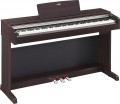Polyphony
The number of voices supported by the digital piano — more precisely, the maximum number of voices that the instrument can play at the same time.
This parameter should not be confused with the number of notes that can be played simultaneously on the keyboard. The fact is that in many timbres, several voices (tone generators) are used for each note at once — this is the only way to achieve a more or less reliable sound. Thus, the required number of voices can be many times higher than the number of notes — for example, the simplest chord of 3 notes may require 9 or even 12 voices. In addition, tone generators are used to play auto accompaniment parts and built-in songs (see below), and here the number of voices can already be measured in tens.
In light of all this, polyphony of less than 90 voices is typical mainly for relatively simple and inexpensive instruments that are not designed for complex tasks. The smallest number found in modern digital pianos is 32 voices. It is desirable for a more or less solid instrument to have at least 96 voices, and in top models this figure can reach 256.
Connectable pedals
The largest number of pedals that can be connected to the Digital Piano at the same time.
Pedals are an indispensable element of equipping a traditional piano, respectively, they are also necessary for electronic analogues of this instrument. However, in stationary devices (see "Body") the pedals are made built-in (see above), so this option is found only in portable models. Also note that if a stationary digital piano has 3 pedals as standard — like in a real piano — then portable digital pianos often have fewer. This is due to the fact that a full set of three pedals is rarely required in fact, and in many cases just one is enough (especially since many instruments allow you to reconfigure its functions).
In general, it makes sense to specifically buy an instrument with three connected pedals mainly for demanding professional musicians who value the full functionality of the pedals (or the ability to tie an extended set of functions to the foot control). In other cases, this parameter is not particularly important.
Built-in acoustics
The power of the native acoustics installed in the Digital Piano.
This indicator directly affects the maximum volume that the instrument is able to produce "on its own", without connecting external speakers. At the same time, it is worth noting that many manufacturers go to the trick and indicate in the characteristics not the rated power (rms power when operating at full volume), but the peak power, which is the highest power that the acoustics can deliver at short “ups” of volume. Peak power values can be quite impressive — in the tens and hundreds of watts — but these figures have a very indirect relation to the actual capabilities of the speakers. Therefore, before choosing, it is worth clarifying what kind of power is mentioned in the characteristics. To do this, it is not necessary to look for detailed data on the instrument, it is enough to compare the power of the speakers with the power consumption (see below): if the claimed power of the acoustics is greater than the power consumption of the entire instrument, then the manufacturer indicated exactly the peak value.

